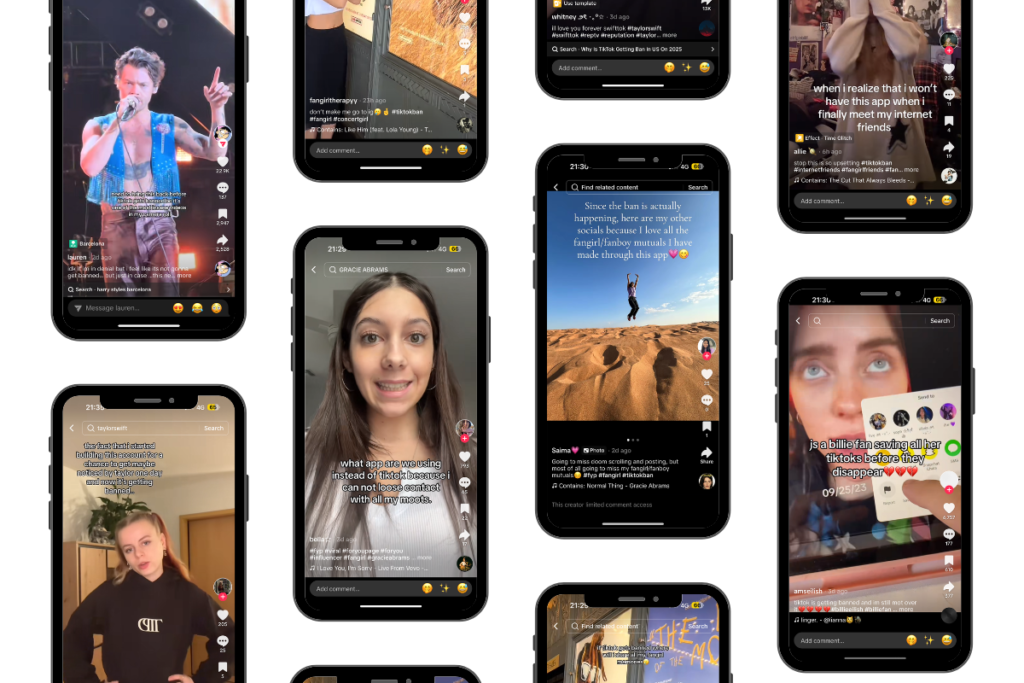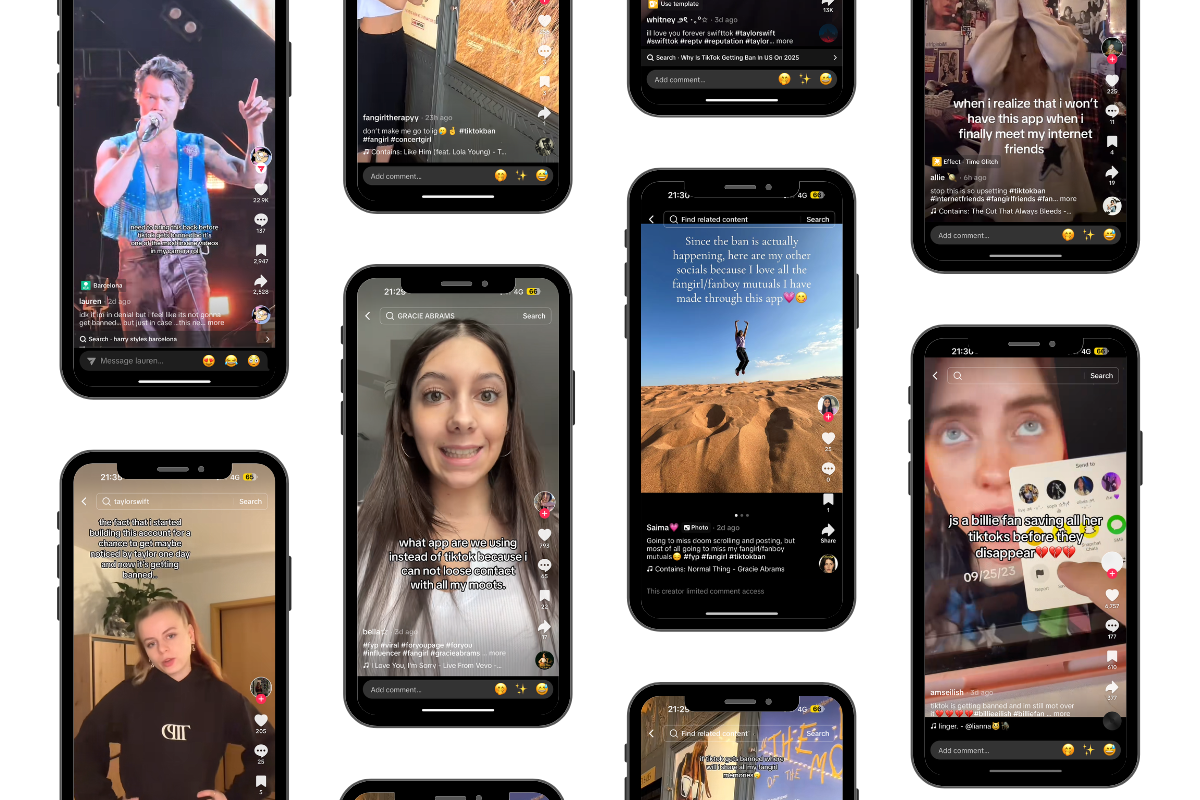How a US TikTok Ban Will Affect Fangirls Worldwide

For countless fans, TikTok has evolved into more than just a social media app.
Whether you’re staying up late scrolling through concert clips, stumbling upon the latest “fangirl bestie” trend that connects you with like-minded fans, or gathering inspiration for your next concert look, TikTok has become a place for fans to connect. It’s a platform where the shared love for an artist, show, or character becomes the foundation for friendships and creativity. TikTok’s unique blend of bite-sized videos and an eerily accurate algorithm allows fans to discover content they didn’t even know they needed.
However, the future of TikTok in the United States has been clouded by growing discussions of a potential ban. As D-Day looms ever closer and no sign of the app’s parent company, ByteDance, surrendering its US data, what does this mean for the future of fangirling online? Let’s break it down.
Why is Tik Tok at risk?
At the core of the proposed TikTok ban are significant concerns over data privacy and national security. U.S. lawmakers have expressed fears that TikTok’s parent company, ByteDance – based in China – could be compelled by Chinese laws to share user data with the Chinese government. This potential access to personal information, including location data, browsing habits, and other sensitive details, has raised alarms about the app being a potential security threat.
TikTok, however, has repeatedly denied these allegations, emphasising that it operates independently of the Chinese government. To address these concerns, the company has taken a number of steps, including relocating U.S. user data to domestic servers operated by Oracle, a Texas-based company. TikTok has also pledged to increase transparency by allowing third-party audits of its data-handling practices and opening up its algorithm for inspection to demonstrate its commitment to user privacy.
However, this wasn’t enough. In April of last year, President Joe Biden signed a law mandating that ByteDance must sell its US assets by January 19, 2025 or face a nationwide operational ban. With the app operators showing little to no sign of compliance, last week saw the US Supreme Court pledge to uphold their law come the deadline, this Sunday.
Despite these efforts, skepticism persists among lawmakers and security experts. Critics argue that, because ByteDance remains a Chinese-owned entity, the potential for influence from the Chinese government cannot be entirely ruled out. Others point out that even if the data were stored in the United States, the company’s ownership structure could still make it vulnerable to pressure from Chinese authorities. As a result,
For many, the debate surrounding TikTok’s future may seem like a far-off issue – a matter to exclusively be discussed between policymakers, tech executives, and legal experts involved in the case. But for users, especially those deeply embedded in TikTok’s culture, the implications are far more personal and immediate.
The role of TikTok in fandom
Digital innovation has played an unfathamobly large role in the evolution of fandom. Where fans once gathered outside recording studios and airports to catch a glimpse of their idols, the advent of the internet transformed the way fans could interact with one another, and their idols. Seemingly overnight, the very interactions that once required fans to travel or wait for hours could happen at the click of a button, bringing these experiences directly into the hands of users.
Tumblr and Twitter became crucial hubs for fans to form new communities and rewrite the narratives they felt had been overlooked or misrepresented by mainstream media. These platforms, fueled by their open-access nature, allowed fans to reclaim their voices, share their thoughts, and build spaces where they could openly celebrate their passions without judgment. And as time went on, these new spaces expanded once more with YouTube, Instagram, and eventually TikTok emerging as fan-driven content flourished in new formats.
Through these platforms, fans began to reclaim power over the narratives they had been excluded from in traditional media, and find others who shared the same interests. It’s this community nature that sits at the heart of fandom, and the heart of TikTok. Beyond the content itself, TikTok fosters a sense of belonging. The comments sections are like modern-day fan forums, filled with inside jokes, shared emotions, and passionate debates. Trends and challenges bring fans together in a way that feels both spontaneous and deeply personal. Without TikTok, where would all that energy go?
Sure, US-based fans will undoubtedly migrate to alternative platforms – much like they have in the past when one platform fades or a new one rises – but this shift will create a fragmented experience within fandoms.
While fans are incredibly adaptable and have consistently found new spaces to connect, the potential loss of TikTok would leave a significant gap in the way fans connect, create, and communicate. More than 60% of the app’s US-users are Gen-Z (born between 1997 and 2012), and that’s a huge proportion of TikTok’s userbase gone overnight. Beyond the loss of the platform itself, the real tragedy lies in what it means for fans.
What can you do ahead of the ban?
Whilst it’s hoped that an agreement can be met ahead of Sunday’s looming deadline, it’s important to be realistic. It’s time to start downloading your data and any videos you don’t want to lose in the shutdown. This ensures that even if the platform is no longer available, you’ll have access to the content that means the most to you.
In addition to preserving your personal content, it’s also wise to start exploring other online spaces where fandoms are thriving. Platforms like Discord, Reddit, Instagram, and X (formerly Twitter) remain strong alternatives for continued discussions, sharing content, and connecting with fellow fans who share your passions.
For those who follow fan creators, it’s essential to consider supporting them outside of TikTok as well. Many creators rely on alternative platforms like Patreon, YouTube, or Etsy to share their work and sustain activities, so if you love their content, now’s the time to follow them across these platforms.
The proposed TikTok ban will no doubt have far-reaching consequences for fans worldwide, disrupting communities that have flourished on the platform and challenging the ways fandoms connect. While fans are resilient and will undoubtedly find new spaces to gather, the unique experience TikTok provides – where creativity, real-time interaction, and global connections converge – will be hard to replace.







